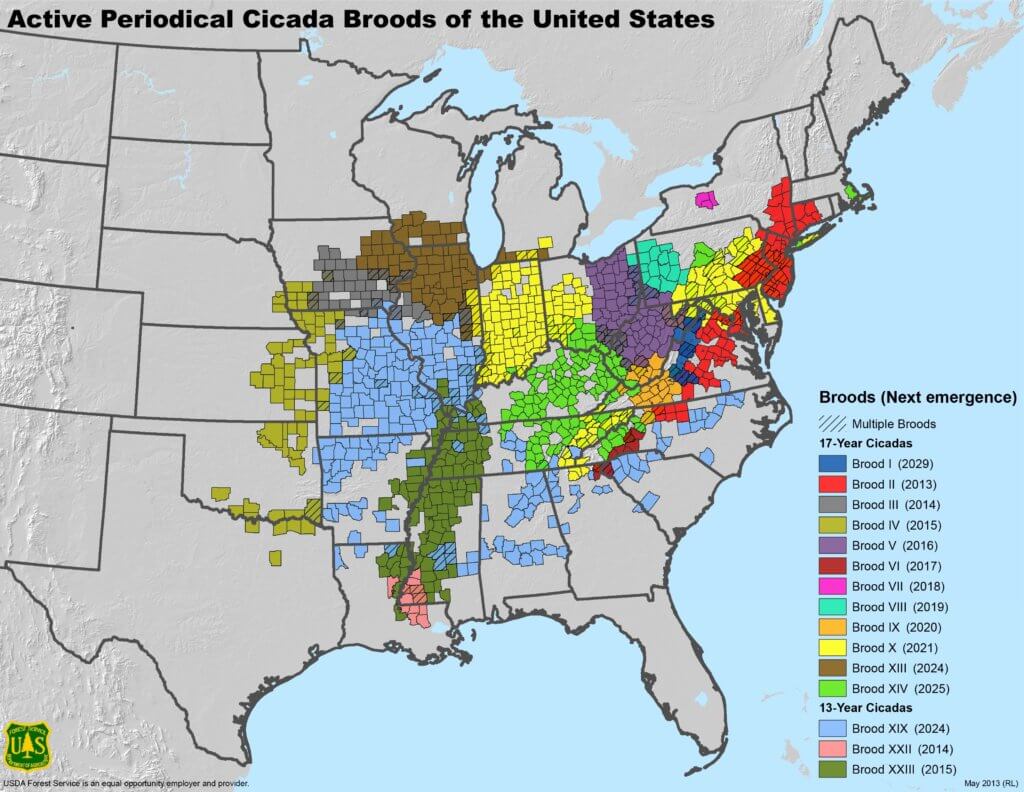It is truly the year of the cicada. Even though the New England area isn’t the most hospitable environment for them, it’s still an incredibly interesting insect. Read on for reasons why you will completely agree with us on that.
While not many will be in New England, these insects will be making their appearance from around Virginia to parts of upstate New York from May to around July. If you live in an area that will see them, you will most likely hear them first. The sound they make is actually a love song. They are looking for a mate, after all. Listen to it here if you’re curious.
York from May to around July. If you live in an area that will see them, you will most likely hear them first. The sound they make is actually a love song. They are looking for a mate, after all. Listen to it here if you’re curious.
So, it may not be your kind of love song, but to female cicadas? Chocolate and roses! Once they find a mate, the females will deposit their eggs and both the males and females will die off. The whole process takes between three to four weeks above ground. What a sad story! It’s Cicada and Juliet. It’s An Officer and a Cicada. It’s A Cicada is Born. You may not think it’s that dramatic but go ask a cicada what they think.
THE CICADA’S SOUND
Tragic or not, what does all of this mean to us? Well, in New England not all that much. Anyone who can hear their sound will certainly notice it. It can be very loud, especially since there will be a whole lot of them. At some point, though, it may act like white noise, helping you sleep. When they are gone and their song is over, you may miss the cicada sound and will have to make do with crickets.
CICADA FACTS
These insects can be really large and look a little intimidating. But they are actually quite gentle. They do not bite or sting. They  don’t transmit or carry disease. They won’t even bother your flowers or garden plants. Should you see one inside your home it was surely by mistake and the cicada is probably just as confused about it as you are – if not more. Since their primary food source is tree sap and your house has none, the best thing you can do is help escort them out the door or window they came in through. If you are in the area where they will emerge, be sure to keep windows and doors without screens closed so they do not accidentally fly in. You may actually see them flying into things – or even people. Don’t judge. They just got their wings after all. Give them some time to adjust! In addition, you may step on the large cicada shells they leave behind once they hatch. Crunchy, but no biggie. It’s just a shell.
don’t transmit or carry disease. They won’t even bother your flowers or garden plants. Should you see one inside your home it was surely by mistake and the cicada is probably just as confused about it as you are – if not more. Since their primary food source is tree sap and your house has none, the best thing you can do is help escort them out the door or window they came in through. If you are in the area where they will emerge, be sure to keep windows and doors without screens closed so they do not accidentally fly in. You may actually see them flying into things – or even people. Don’t judge. They just got their wings after all. Give them some time to adjust! In addition, you may step on the large cicada shells they leave behind once they hatch. Crunchy, but no biggie. It’s just a shell.
CICADA MYTHS
Contrary to some beliefs, they are not the same as locusts. It’s not fair to associate them with a plague from the Bible! They are a different species entirely. So, not true. Also a myth – it’s an invasion. Not so. It’s more like a miracle. Wherever they emerge, they were indigenous to that area and have been waiting to show their buggy faces. They are also not dormant or hibernating during the years you don’t see them. They are moving through the soil helping to add nutrients to the earth
CICADAS TRUTHS
If you’re in the emergence zones, there are going to be a whole lot of them. The brood that is emerging this year is Brood X. It’s the largest of the broods in 17-year cicadas. Just how large is this brood? We are talking over one million cicadas per acre! Lots of shells left behind, lots of new flyers, and lots and lots of noise. They will be more prominent where there are a lot of trees, but if you’re in the zone, your business and home can expect them to be flying about. See the zones here.

Nobody is saying you have to love these insects. But you (and we) shouldn’t treat for them. They are docile and only around for a little bit of time anyway. And even during the time they are here, they won’t harm or threaten plants, pets, or people. They are not a pest in the way we think about pests. You may find them annoying and loud, but they are 100 percent harmless.
Look on the bright side. If this is the third time you’re seeing them, you’ve been around a while! If it’s the fourth time you’re seeing them, do you have any tips for the rest of us on longevity? So that’s the bright side. If you can’t find the silver lining, just keep this in mind: they were surely here first. And if you don’t like their love song, that’s ok too. Maybe they don’t like yours either.